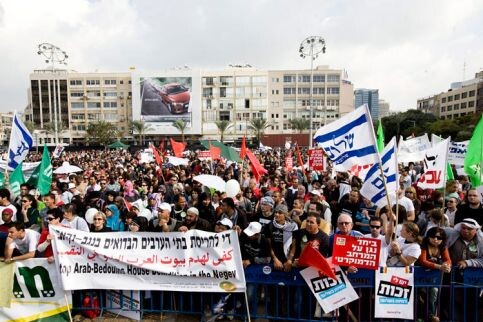The Electronic Intifada 25 February 2011

Activists and civil society organizations protest in Tel Aviv for human rights, December 2010. (ActiveStills)
If it has not become clear by now then we should make no mistake: Israeli civil society organizations (CSOs) working in the fields of human rights, peace and solidarity are in an increasingly hostile and precarious position in the Israeli public sphere. Similarly, our partner organizations working on issues of Israel and the Palestinians in the Netherlands report an increasingly hostile environment.
These organizations, which operate with a variety of mandates and in a number of similar but diverse fields, all share a common understanding that democracy, peace, social justice and human rights must be protected for all persons at all times and that working for such values is becoming increasingly difficult in Israel. Israeli civil society is not monolithic. The CSOs often share common goals while at the same time differ in their opinions and methods about how to achieve them. In common, however, is the clear desire to create or promote a democratic approach to supporting peace and human rights.
In one form or another, our actions, views and ideologies are seen as “anti-Israel.” We see such interpretations as a shallow effort to avoid discourse and to rule by power. We do not believe that there is but “One Israel” composed of one social and political identity and we refuse to reduce the very society that we struggle to preserve to such levels. As active members in the Israeli public sphere we seek out ways to promote values that cannot be interpreted in any other way than universal, democratic and human rights-based. Attempts to paint our actions otherwise are disingenuous, biased and based in a clear political agenda designed to preserve the status quo, demonize our community and to shut it down.
This is unacceptable in any society considered to be democratic. In Israel there is a clear and disturbing effort to go beyond challenging what we do to making our legitimacy contingent on abiding by restrictive guidelines that we have had no part in authoring. We need not look too far in order to remind ourselves of the dangers of a society cleansed of active civil society organizations in which discussion about human rights is chilled because those same organizations are being forced to defend their very existence and, at times, CSO workers are forced to defend their physical safety and freedom.
For this reason it is unfortunately necessary to raise this red flag and once again make arguments that in a proper democratic sphere would be taken for granted. There is more than a belligerent wind blowing through Israeli and Dutch societies. Increasingly, in the Netherlands and in Israel political discourse is turning hostile, intolerant and even violent. Whereas in the past the claims made by organizations like ours were sometimes answered by the state or challenged in the — up to now — healthy and vibrant public sphere, now we are finding that we are not only not being responded to in a less than democratic fashion but that the extremist discourse of some organizations in the public sphere has been adopted and implemented by arms of the state, be it in the executive or in legislative branches.
Conscious efforts are being made to affect funding and to legislate a more restrictive and hostile space for our community. The situation has even reached such a level of the absurd that Israel’s Knesset (parliament) is preparing itself to establish an investigative committee directed specifically at our community. Aggressive language is used by officials at the highest levels of the Israeli government to dehumanize specific human rights organizations and similar language is increasingly being reported in the Netherlands by members of civil society connected to Israeli CSOs.
We can only hope that Uri Rosenthal, Minister of Foreign Affairs of the Netherlands who recently visited Israel and his counterpart, Minister of Foreign Affairs Avigdor Lieberman, will heed a call for a return to reason in both countries and for a commitment to protecting the rights and integrity of civil society organizations working cooperatively for a better future for all persons. Civil society activists do not expect the state to agree with what we do, but neither do we expect to be attacked by the state, at least not in a democracy. It is up to all of us to ensure that democratic values are protected, especially when governments refuse to do so.
Dr. Ishai Menuchin is the Executive Director of The Public Committee against Torture in Israel. He is the 2003 recipient of the Rothko Chapel Oscar Romero Award for Commitment to Truth and Freedom, one of the founders of Yesh G’vul (the soldiers’ refusal movement), a long time peace and human rights actist, author and editor.
